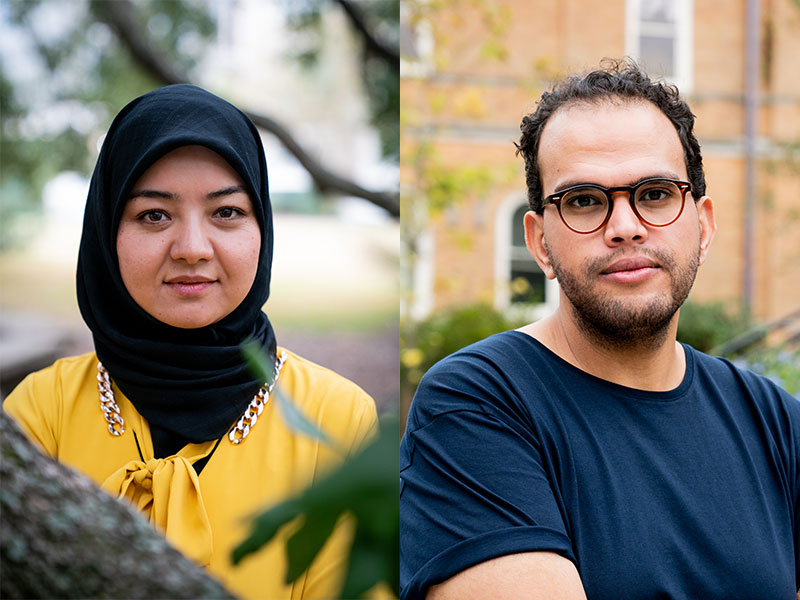Visiting global scholars bring unique perspectives to Tulane campus

06/06/2023
Aug. 21, 2021, will forever mark a before and after in the life of Mariam Taqaddusi. She was airlifted from Afghanistan to Poland just six days after the Taliban military offensive reached Kabul, the official withdrawal of international troops from Afghanistan and the Taliban forces taking over the country. After years of devoting her life to research, teaching, and advocating for Afghan women and children, Taqaddusi had now become part of the 3.4 million conflict-displaced Afghan population.
Meanwhile, in another part of the world, researcher and human rights advocate Islam Ahmed feared for his safety and academic freedom in his home country of Egypt.
“I was already exiled inside my own country, inside the borders of systematic repression,” Ahmed recalled, alluding to the time he was arrested alongside his research director “because he was actively advocating, publishing and convening about human rights violations in Egypt, participating in international events” such as the Universal Periodic Review. Ahmed set foot for the last time in Egypt in March 2020, which also coincides with the last time he secretly saw his family and friends in person before fleeing to Beirut, Lebanon.
Ahmed and Taqaddusi arrived in New Orleans and officially joined the Tulane community in the Fall ’22 semester, joining Thyn Zar Oo, who fled a military coup in Myanmar in 2021, as part of the Tulane Global Visiting Scholars Program. Spurred on by interest from Tulane faculty and staff, the Office of International Affairs (Tulane Global) established the program to broaden and deepen global perspectives at Tulane while supporting scholars who face significant risk to their lives and well-being.
“In the face of humanitarian crises and global displacement, last spring, our faculty called for Tulane to respond. We established a task force to explore how we, as a higher education institution, can address these inequities and create a more inclusive global community at Tulane,” said Laila Hlass, associate provost for International Affairs.
Scholars in the program are able to contribute their global research, perspectives, and when fitting, teaching, to enrich students, staff, faculty and the larger community. As a member of the national organizations Scholars at Risk (SAR) and the New University in Exile Consortium, Tulane is committed to expanding the university’s global engagement.
Hosting Taqaddusi and Ahmed at Tulane has been a university-wide collaboration with the School of Liberal Arts (SLA), which has committed to temporarily host both scholars; Newcomb Institute, which has provided research funds and office space; the Office of Academic Affairs & Provost, Office of International Affairs; the Office of International Students & Scholars; and Tulane’s Scholars at Risk Taskforce.
According to SLA’s Dean Brian Edwards, “Hosting scholars from national contexts far removed from our own, sharing their expertise and perspectives, greatly enriches our intellectual community. We are thrilled to host these at-risk scholars as part our school’s mission to expand language education, investing in area studies programs and building a more globally sophisticated curriculum to prepare our students for the challenges of a complex international landscape.”
The scholars have participated in class visits, moderated movie screenings with Q&As, delivered lectures, attended conferences and research workshops, and shared their stories and knowledge with the Tulane community.
As part of the program, scholars are matched with faculty mentors to support their integration on campus and academic interests. Ahmed is affiliated with the Department of Political Science and the Middle East and North African Studies Program, and his faculty mentors are Edwige Tamalet, Martin Dimitrov, and Andrew Leber.
Meanwhile, Taqaddusi is affiliated with the Gender and Sexuality Studies Program and the Newcomb Institute, and her faculty mentors are Katherine Johnson and Anna Mahoney.
